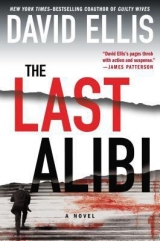
Текст книги "The Last Alibi"
Автор книги: David Ellis
Жанры:
Триллеры
,сообщить о нарушении
Текущая страница: 20 (всего у книги 31 страниц)
72.
Jason
Monday, July 22
“Hey.” Joel Lightner sticks his head in my office, cautious.
I wave him in. “It’s okay, Lightner. You’re still doing a job for me, whatever else.”
“You’re pissed at me,” he says when he walks in and helps himself to a seat.
“You’re not at the top of my list right now,” I agree.
“I’d like to see that list. I’m pretty sure there’s only one name on it: Alexa Himmel.”
I put down the court opinion I was reading. “I take it you didn’t come to apologize.”
“Apologize? Why would I apologize? For the background check? Shauna asked me for a favor, and she was doing it out of genuine concern for you. And she’s right to be concerned.”
I raise my hands in surrender. “Let’s stick with business,” I say.
He holds his stare a moment, just to show his displeasure, before moving on. “We’re having a hard time digging up records, like you thought,” he says. “We’ve found some in a warehouse. So far, no recently released ex-cons—by recently, I mean in the last eighteen months—were interrogated by you. We aren’t done, but we’re starting to run out of places to check. There are big gaps. You got moved around all the time when you were on Felony Review. It’s not like you even stuck at one station house.”
None of this is a surprise, but it’s a big blow nonetheless. We’re running out of places to check. We’re running out of ways to catch “James.”
“Joel, this signature, the thing he does to all the victims. I need to know what it is.”
“We’ve already talked about this,” he says. “They won’t tell me. I won’t ask.”
“It’s the key to this, the more I think about it. Whatever it is he’s doing to them, he’d probably want to tie it to me, right? If he’s framing me, he’d want to make that signature tailored to me.”
“Yeah, you’re probably right,” Joel agrees. “If he’s doing some strange, crazy thing to all the victims, he’s probably doing it because it implicates you. But what?”
“I don’t know,” I say. “That’s why you have to get it for me.”
Joel raises his hands. “I can’t help you. Even if I wanted to, they wouldn’t tell me.”
There’s got to be some way. I have to figure out that calling card he’s leaving at every crime scene.
“Okay.” Joel starts to look uncomfortable, rubbing his hands, stalling. “So . . . so listen.”
I look up at him.
“I’m just going to say this as your friend. I’m not sure about that lady, Jason. I got a bad feeling about her.”
“You don’t know her.” I wave a hand. “Leave it alone.”
“Jason—”
“She has a very sweet side, Joel. She does. Does she come on strong? Okay, maybe. But she’d do anything for me.”
“Yeah? That so?”
“Yeah.” I nod at him. “The alibi, for example. She’s willing to say I was with her at the time of each of the five murders. She’s willing to be my alibi. Now, how many people would do that?”
Lightner doesn’t seem as impressed as I am. “I remember in my office, you guys said you were going to square up dates to confirm.”
“Yeah, we confirmed dates, and you know what? She wasn’t with me on any of those nights. Not one, Joel. And yet she’s willing to say she was. If the police walked in right now, she’d swear on a Bible that we spent those evenings together at my house.”
Joel thinks about that for a long time, seemingly unmoved, but thinking. “That’s a dangerous game, first of all. It could get you both in trouble.”
“I know. I told her that. I told her there were all kinds of ways you can attack an alibi. But she said she was home alone, just like me, on each of those nights, but she didn’t do anything that would establish that. Didn’t make any phone calls. Didn’t order food to the house or order a movie off of TV or have any visitors over or anything that would tie her to her house.”
I don’t even know how to order a movie off the television, she said.
And I never, ever have food delivered.
“It’s still a bad idea,” Lightner says again.
“I know, Joel. I’m not going to let her do it. But the point is that she’s willing to do it. Does that sound like someone who cares about me, or someone who doesn’t?”
Joel makes a face. “That’s one way of looking at it,” he says.
“Is there another way?”
Joel lets out a bitter laugh and shakes his head again. “Of course there’s another way,” he says. “And if you didn’t have your head so far up your ass, you’d see it, too, Counselor.”
I wave a hand. “Then enlighten me,” I say.
He leans forward and cups his hand over his mouth, like he’s shouting across a canyon. “She’s not just giving you an alibi,” he says. “She’s giving herself one, too.”
PEOPLE VS. JASON KOLARICH
TRIAL, DAY 4
Thursday, December 12
73.
Shauna
Judy Bialek hurries into her reception area, two work bags slung over her shoulder, looking just a bit disheveled as she nods to her receptionist and waves to the lawyers waiting for her. “Sorry I’m late, everybody, crazy morning,” she sings as she brushes past us into her chambers. She is a divorced mother of three kids, all in high school. It is somehow comforting, in the midst of the angst and stress of this trial, to see the judge coping with some stress of her own.
Not that a judge is ever late. The meeting starts when the judge says it starts. Judges make you wait all the time—I remember once Judge DeCremer, in the civil division, scheduled no less than four pretrial conferences for the same time and made us all wait for him. I showed up with my client at one o’clock and left at a quarter to five.
The receptionist’s phone buzzes. “You can go on in,” he says to us.
Inside her chambers, the judge looks a bit more composed, sitting behind her long black desk, everything neatly in its place, her hair pulled up in back now, her black robe hanging to the side on a coatrack.
“I want to talk schedule,” she says. “The government only has one more witness, is that correct, Mr. Ogren?”
“That’s correct, Judge. Her direct testimony won’t take half an hour.”
“Okay. And then the government will rest?”
“Yes, we will.”
The judge nods. “Ms. Tasker, I suppose the defense will move for a directed verdict.”
“Absolutely, Judge,” I say, but nobody in this room thinks the judge is going to toss the case for lack of evidence. This case is going to the jury.
“Assuming that your motion is denied, Ms. Tasker, can you give me an idea of whom you plan to call, and why, and how much time you need? Oh, and I forgot—you reserved your opening statement. How much time do you expect to use on your opening, too?”
I haven’t told them anything yet. The defense is entitled to considerable leeway in withholding its game plan in a criminal case. Jason, of course, has the right to testify and the right not to testify, and that gives me the right to leave everyone guessing. Beyond whether Jason testifies, I haven’t given a hint as to whom I may call in our defense, if anyone.
Don’t tell them, no matter how hard the judge pushes, Jason advised me. She’ll push you, but she can’t make you tell her. These aren’t the civil courts you’re used to. Don’t let them know until it’s time.
I’ve followed that advice, to the chagrin of the judge, until now. Now it’s time.
“Judge, we’ve decided to waive our opening statement.”
The judge is surprised. So is Ogren. His eyes have narrowed and he’s blinking rapidly, thinking it through. First, we asked for the right to reserve our opening statement until the defense’s case. Now we are forgoing it altogether. Why? He’s probably narrowing the reasons down to two. One possibility is that our case is so incoherent that I don’t have a story to tell. We’ll drop a few bombs and try to muddy the picture, but we don’t have a logical theory of what really happened, start to finish, so we won’t bother trying to craft a narrative.
The other possibility is surprise. We’ve been holding back our argument and we’re continuing to do so, because we want to spring it on the prosecution as late as possible.
I’m sure Ogren prefers the former theory to the latter.
“Very well,” says the judge. “Do you plan on calling any witnesses?”
“We reserve the right to call everyone on our list for the moment,” I say. “But we’re going to start, today, with my client.”
Roger Ogren and Katie O’Connor each stir just a bit, casting glances at each other, Ogren taking a deep breath. They never knew for sure. They didn’t know if, they didn’t know when Jason would testify.
“I see.” The judge falls back in her chair. “Would it be fair to assume that Mr. Kolarich’s testimony will take up the rest of this week, today and tomorrow?”
“I would assume so. At that point, Friday evening, I should have a good idea whether we’re going to call anyone else.”
“Judge,” says Ogren, “Ms. Tasker has named, as you said, the entire roster of Area Three detectives on her witness list. Including several detectives who didn’t work on this case at all, by the way. First of all, we’d request that Ms. Tasker give us a good reason why they have to be called, and second, Judge, these men and women don’t all work nine-to-five shifts. It’s going to take some work to bring them in. We need as much notice as possible. And again, I’d hope that we could get a good explanation as to the relevance of—”
“I understand, Mr. Ogren. It’s not my first trial.” The judge holds him up. Ogren has the tendency to talk down to people, and judges are not fans of condescension.
“Okay, everyone. Let’s put on your final witness, Mr. Ogren. Then, Ms. Tasker, I’ll give you fifteen minutes to argue for a directed verdict. I will tell you right now that you will face a tall climb, but of course I’ll hear you. Assuming we go forward from there, Ms. Tasker, do you think Mr. Kolarich’s direct testimony can be completed today?”
“I would think so, Judge.”
“So that would give Mr. Ogren tomorrow for cross-examination and then redirect and recross, and maybe we could get that done by then. Okay. Okay.” She nods. “Ms. Tasker, tomorrow, you will give me a smaller list of witnesses you’re going to call. It’s not going to be the entire Area Three squad room. You understand that?”
“Yes, Judge. It won’t be that long.”
“Very well. Let’s get out there,” says the judge.
74.
Jason
“We call Detective Molly Hilton,” says Katie O’Connor.
Molly Hilton is a short woman with frizzy blond hair and a hard look about her. I’ve never met her, but Lightner apparently knows her ex-husband from when he was a cop in Marion Park. These cops are a whole community unto themselves.
“My assignment,” Hilton says, “was to piece together the sequence and timing of events on the day of Ms. Himmel’s death, for both Ms. Himmel and Mr. Kolarich.”
Oops, Katie forgot to tell her to call me the defendant.
“Anything else?” asks O’Connor.
“I also wanted to figure out where Ms. Himmel was staying at the time of her death, whether she was living at Mr. Kolarich’s house or her own.”
“In the course of undertaking this assignment, Detective, did you review phone records?”
“I did.”
Katie O’Connor refers again to Alexa’s phone records on the day of her death, Tuesday, July 30, previously admitted into evidence:
CALL DETAIL RECORDS FOR CELL PHONE OF ALEXA M. HIMMEL
Tuesday, July 30
Time
Destination
Length of Call (minutes)
Originating Cell Site
6:14 PM
555-0150
1
221529
8:16 PM
Kolarich Home
2
221529
“Detective Hilton, do you see the first line on this chart, a phone call made from Ms. Himmel’s cell phone at 6:14 P.M. on the day of her death?”
“I do.”
“Did you track down that phone number?”
“I did.”
“And whose phone number is that?”
She says, “It’s the phone number for Mario’s Pizzeria in Overton Ridge.”
“I see. And did you investigate this phone call any further?”
“Yes, I did. We subpoenaed credit card records to review any transactions that might have taken place on that date,” she says.
“And did you find anything?”
“Yes,” she says. “Ms. Himmel used her Visa card that evening to buy a small pizza and chef’s salad from Mario’s. We obtained from Mario’s a copy of the delivery receipt.”
“Is this the receipt?” Katie O’Connor shows the witness a yellow receipt from Mario’s Pizzeria, for a charge of $19.62, plus tip, with Alexa’s signature on it.
“That’s the receipt,” says the detective. O’Connor admits the receipt into evidence without objection.
“Does the receipt have a date and time indicated, Detective?”
“Yes, it does,” says Hilton. “A small pizza and salad from Mario’s Pizzeria were delivered to Ms. Himmel at 7:02 that evening.”
I have to stifle a smirk. I look down and control my expression.
“What other information did you pursue, Detective?”
“We looked at her cable television bill for the month of July,” says Hilton.
“Is People’s Twenty-five a true and accurate copy of that bill?”
“Yes, it is.”
O’Connor admits that bill into evidence, too.
“As you can see,” says the detective, “on the evening of her death, Tuesday, July thirtieth, Ms. Himmel ordered the movie Doctor Zhivago on pay-per-view television at 7:07 P.M.”
Just after the pizza arrived. A pizza and a movie—a three-hour classic at that, a film that would run past ten o’clock that evening. Not the behavior of someone living at my house. But more important, much more to the point, not the behavior of someone who was planning on dropping by my house, either. It’s the behavior of someone who was kicking up her feet and settling in for a quiet night at home.
Or someone who very much wanted it to appear that way.
Oh, Alexa. How did I underestimate thee? Let me count the ways.
FIVE MONTHS BEFORE TRIAL
July
75.
Jason
Tuesday, July 23
I drop Alexa off downtown and then head to work. I have a nine-thirty in federal court, a status on a weapons case, which is bad news for my client because a federal gun charge will get you triple what it would on the state side. Trial is scheduled for six weeks from now, if it goes. The government wants my guy to flip on people up the chain, and so far my client has refused. I come from a neighborhood where you don’t narc on your buddies, so I understand my client’s reluctance, but my loyalty is to him, not his pals, and he could shave five years off his sentence if he starts talking.
I get back to my office after ten and push around some paper, a few files I’ve kept, the ones I haven’t referred out to other lawyers. I realize that it’s not an optimal strategy for a lawyer, who makes his living representing people for a fee, to push away all his clients. It’s not exactly a recipe for long-term success. But long-term success is not on my agenda right now.
The case files holding no interest for me, I return to the notes I’ve scribbled about my time interrogating suspects as a prosecutor, trying to relax my mind and come up with some breakthrough. It has to be somebody I put away, and it has to be someone who just got out of prison. This guy has way too much of a hard-on for me to have kept his powder dry for years. This is a guy who stewed in prison, every sit-up in his cell at night, every repetition of the bench press in the prison yard, every moldy piece of bologna he ate, every night staring at a cement ceiling, every morning in the shower, looking over his shoulder, blaming me for all of his troubles, plotting out what he’d do to me when he got released.
He’d want to get started on that plan right away. This is not a guy who’s enjoyed years of freedom since. This is a guy who got out of prison and got right to work.
I drop my head, feeling helpless. My stomach is revolting against me and my body temperature is fluctuating wildly from sweat to chills and back. I don’t want to take a pill. I didn’t take one for several hours on the night we tried to trap “James” at Linda Sparks’s house, the adrenaline rush distracting me, and my mind was sharper than it has been for months. In fact, it was the night I realized that “James” had been mimicking back to me one of my favorite lines during interrogations, the you’re nobody to me comment.
So, no pills. No pills because they cloud my mind, and I need my brain to function right now, I have to think, I need to process information, I need to think out of the box, one of the things the corporate robots say, there has to be something, some way, but I’m so damn tired, my vision losing focus, maybe if I just sleep for a few minutes, a quick catnap . . .
“Who are you, James?” I mumble, and he’s in my office, James in my office, James telling me he didn’t kill anybody, James asking me how to frame somebody, James in my office when I leave to take a pill in the bathroom, James taking my Bic pen, James dumping out my trash for Kleenex or an empty bottle of water, anything with saliva or mucus for DNA, maybe fingerprints, What evidence do I have against you? he asks me, taunting me over the phone, Just some souvenirs I collected from you, just some souvenirs like a chewed-up pen, maybe some Kleenex from the trash, a water bottle, just some souvenirs, because That’s How You Frame Somebody by Jason Kolarich, Chapter One, first you pick a time when I have no alibi, Chapter Two, next you pick victims connected to me, Chapter Three, then you take things from my office that implicate me, souvenirs, and you leave them at the crime scene, James in my office, taking souvenirs—
My head pops up off the desk, my eyes taking a moment to return to focus, my brain reorienting.
Chapter Four, you plant incriminating evidence at the patsy’s house.
Or, failing that, the patsy’s office.
I jump out of my chair. Did I say that to him? Did I give him that advice? I don’t know. The fog is too thick. But it’s what I’d do if I really wanted to lock somebody down; I’d leave some morsels at the crime scene, nothing obvious but enough for an inquiry, and then, for the cherry on top, I’d put something really incriminating at the patsy’s house or office.
As far as I know, he’s never been inside my house. But he’s been here in my office.
There’s something here, I realize. Right here, in this office. He planted something here, something subtle, something hidden, something the police will specifically search for. It would need to look hidden. It can’t be dangling from the ceiling or plastered on the wall like a trophy. It has to look like I didn’t want anyone to find it. But it’s here.
Why didn’t you think of this before? You know why. It’s those little white round bundles of joy that turn your brain to mush. How much more proof do you need?
I go to the corner of my office and dig my fingers against the cheap carpeting, feeling for a hole, a place where he could have stuck something. I cover the entire perimeter of the room, pulling back case files, the refrigerator, the couch. Nothing. Nothing I can find, anyway. I don’t even know what I’m looking for.
The couch. I search under it and run my hands under cushions, feel under the bottom. Nothing.
The fridge. That would be fiendishly clever of him, brilliant in its simplicity. But nothing there. No lock of hair tucked into the small freezer section, no bloody knife taped to the bottom.
I go through my desk drawers, removing everything, searching through my coffee cup full of pencils and pens, everything I can think of. I don’t even know what I’m looking for. Bigger than a bread basket? Probably not. A woman’s fingernail? Her blood?
I turn my attention to the case files strewn around my office. Sure, maybe. He could have dropped something inside them, into one of the accordion files or one of the manila folders shoved within them. It could be anything. It could be anywhere.
This is what he wants, I think to myself. He wants to make me crazy, he wants me chasing my own shadow, my imagination scattering in all directions.
I drop down on the carpet, woozy and nauseated. Over three hours now, and no pills. Hold out. Hold out. You think better when you’re not on those ridiculous things, those beautiful tablets, that horrible, soul-stealing medicine, those delicious, wonderful pills.
I force myself up, my muscles seizing, my stomach twisting, my skin burning. I stand in the center of my office, only a few feet from my desk, five feet from each wall. The radiator, I should check the radiator, complete with peeling paint, below my long horizontal window.
Nope. Nothing underneath, nothing shoved inside. I remove the cover and can’t put it back on.
I finally succumb to the itching and start on the backs of my hands, my knuckles, my forearms, scratching furiously, knowing that I’m only spreading it like wildfire across my skin.
“Where the hell is it?” I hiss.
Leave. Walk out of the room, get some fresh air, empty your mind and start fresh.
I try my desk again, pulling out the drawers, patting underneath. The chair. I check the chair for the first time, a burst of adrenaline for an original thought, some place I haven’t already checked, but no, no murder weapon or DNA evidence that I can find, assuming I can find it at all because I DON’T KNOW WHAT IT IS I’M LOOKING FOR.
Then back to the knuckles, bloody now, and my beet-red forearms. And then my calves and thighs.
“Dammit,” I say to nobody, standing straight again.
I let out a long breath. I know it’s here. I know it.
But I can’t find it.
“Hey, stranger.”
I spin around. It’s Alexa, standing in the doorway.








